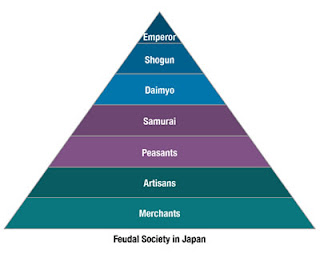Having - Being
Dynamic - Static
Merchant - Priest
Material - Spiritual
When the merchant class dominates society, then the material takes precedence over the spiritual.
Liberal democracy removed all stratification and levelled society - no aristocrats, or God above - making an open marketplace of the world, in which every newly freed individual was invited to compete.
In a stratified system competition was horizontal, between those on the same level, but under liberal democracy competition also becomes vertical, as individuals seek to move upwards. As a result, competitiveness is foregrounded, and this open, free, and competitive environment creates an ever present tension - “Every moment must be profitable.”
To this mindset, spiritual values - meditative practice, simply ‘being’ - become an inexcusable waste of time.
In a stratified system competition was horizontal, between those on the same level, but under liberal democracy competition also becomes vertical, as individuals seek to move upwards. As a result, competitiveness is foregrounded, and this open, free, and competitive environment creates an ever present tension - “Every moment must be profitable.”
To this mindset, spiritual values - meditative practice, simply ‘being’ - become an inexcusable waste of time.
Material development without spiritual development can only lead to the general feeling of discontent that we see today.
In a society based on the education and development of wisdom rather than of information, the whole orientation is very different.
Although it's an oversimplification, you could say that one is centered on being, the other on having.
The fascination for always having more and the horizontal dispersion of knowledge are both things that take us away from inner transformation. Since the world can only be changed by changing ourselves, always having more of everything doesn't matter very much.
Dissatisfaction arises from the habit of seeing what's superfluous as being necessary. This isn't just a question of wealth, but also of comfort, of pleasure, and of 'useless knowledge'.
The only thing one should never be satisfied with is one's wisdom, and the only efforts that one should never see as sufficient are the efforts one makes toward spiritual progress and achieving others' good.
[Matthieu Ricard]
The Monk and the Philosopher, p.316
We can usefully understand our time, I often think, by seeing in it the final result of the centuries-long tension between the merchant class - that ‘bourgeoisie’ - and everyone else.
Pre-modern societies, in every case that I know of, always kept the merchant class in their place, and that place was usually right at the bottom […] below the farmers and artisans, because their work, while sometimes necessary, essentially created nothing of value. This was the pattern worldwide.
In medieval Europe […] the merchants, bankers and money people were hemmed in by a network of customs, religious edicts and structures like guilds and professional bodies. Money had to be kept under control, precisely because of the power it had to ignite the powerful flame of want.
[…] the story of the world since the eighteenth century has been the story of the setting of that flame, and the resulting fire. We are all bourgeois now: which is to say that we are all driven forward by want.
[Paul Kingsnorth]
‘Want is the Acid’, The Abbey of Misrule
In trying to articulate the causes of American restlessness, Tocqueville […] focuses first on the fact that a democratic social condition inspires a love of material well-being. He explains that aristocracy suppressed the concern with material well-being by putting it beyond the reach of most people and placing it almost beneath the notice of the privileged few, who rarely needed to concern themselves with it.
Democracy, on the other hand, removes the barriers to material prosperity among the poor as well as the protections of it among the rich. In this way, a democratic social condition encourages people to care about material prosperity and to focus their attention and efforts on it.
And democracy does more than open up a path to material prosperity. It also magnifies the significance of material well-being by collapsing all other distinctions. Tocqueville observes that in democracies, “money is virtually the only thing that still creates very visible differences among the [men of democracy] and sets some apart from their peers. The distinction that is born of wealth is enhanced by the disappearance and diminution of all the others.”
When the old sources of prestige—birth, estate, or occupation—cease to be important, money becomes the arbiter of success.
Tocqueville saw the magnified importance of material well-being as problematic for a few reasons. The person who seeks only material pleasures is tormented by the thought that life is short and his time to enjoy himself is limited. “The memory of life’s brevity constantly spurs him on.”
This makes the pursuit of material pleasures urgent and frenetic. It fills the man of democracy with “anxieties, fears, and regrets, and keeps his soul in a state of constant trepidation that impels him again and again to change plans and places.”
[Dana Jalbert Stauffer]
‘“The Most Common Sickness of Our Time”: Tocqueville on Democratic Restlessness’, The Review of Politics 80 (2018), p.448
Related posts:-


